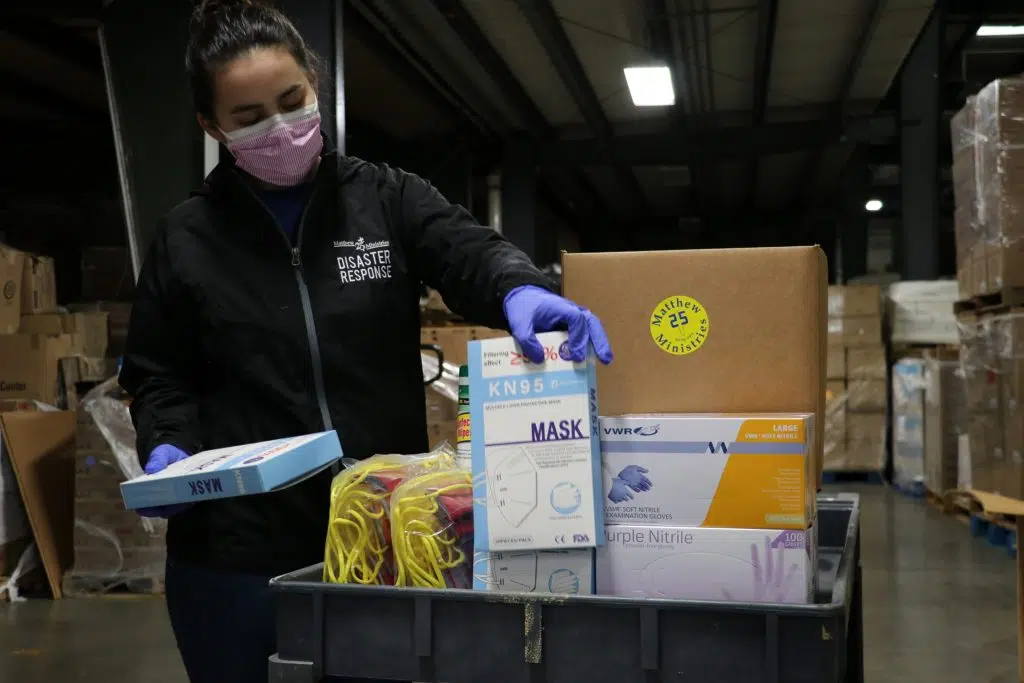It’s finally spring! The long winter months are over, which means it’s time to open your windows, enjoy the warm weather, and of course, start your spring cleaning. This springtime ritual allows you to declutter your home – and life – for a clean start (Hint: Check out the decluttering master Marie Kondo for inspiration!).
Although it can sometimes be difficult to part with unused items, there are organizations like Matthew 25: Ministries that can put them to good use. They use the products donated to them by corporations, organizations and individuals for their humanitarian aid and disaster relief efforts at the local, national and global levels. That means that the items you let go of can go on to do good in the world.
Matthew 25: Ministries began after the founder Reverend Wendell Mettey made a trip to Nicaragua in 1990 and vowed to find a way to help the poorest of the poor. In the beginning, supplies were carried by mission teams in suitcases, but today the organization has grown into one of the most efficient charitable organizations in the country – distributing more than 15 million pounds of goods around the world each year in 40 foot containers or 53 foot semi-tractor/trailers.
So, how does it work? Read on to find out!
The donation process
Collection
Donations come from many sources – individuals, churches, corporations and businesses, civic organizations, hospitals, clinics and schools. Donations can include gently used, returned, overstocked, slightly damaged, obsolete or other distressed products. Corporate product donations are a key to success for Matthew 25: Ministries. Since 1991, Matthew 25 has distributed approximately 250,000,000 pounds of products to more than 70 countries.
Processing and sorting
Next, with the help of their amazing volunteers, Matthew 25: Ministries begins evaluating, sorting and processing these large volumes of donations in their 200,000 square foot processing center in Blue Ash, Ohio, just outside of Cincinnati. This step is crucial for ensuring quality and determining that the products meet social and cultural considerations of the area where they will be distributed. These products are then sorted into pallets and packaged to ensure rapid distribution upon receipt.
Distribution to communities in need
In total, Matthew 25: Ministries has sent approximately 250 million pounds of aid across the world. They often work in conjunction with partner organizations that are already on the ground in the recipient destination to help determine what items are needed most. When a catastrophic event occurs, Matthew 25 is prepared to respond with product shipments and services that meet the needs of the specific crisis. Last year, we saw this mobilization in action at the onset of and during the COVID-19 pandemic. World Health Organization declared COVID-19 a pandemic on March 11, and Matthew 25: Ministries began distributing supplies to partners on March 16th, including emergency supplies such as masks, gloves, sanitizer and more to front line organizations and other organizations caring for those in need. In this case, their distribution plan saw another aspect – safety precautions like social distancing, enhanced sanitation practices and no-contact registrations in order to protect the health of both beneficiaries and responders.
Benefits of donating
Making donations and offering other forms of support gives companies the opportunity to help those in need while creating a positive corporate image. For example, during recent winter storms in Texas, various corporations stepped up to help by donating products to Matthew 25: Ministries. With the help of generous corporate in-kind donation partners like Cintas and Procter & Gamble, the organization shipped approximately 16 truckloads totaling more than 400,000 pounds of aid to partners in Texas and their disaster response team distributed 650 P&G personal care kits, 1,900 rolls of Charmin toilet paper, 700 rolls of Bounty paper towels and completed 600 loads of laundry through the Tide Loads of Hope program.
These wonderful donations make a significant difference in the lives of others. They also help raise brand reputation and awareness. Companies and brands that generously donate their products can cultivate a positive public image with consumers and with their own employees. Everyone loves a company that gives back.
Whether you’re a company or an individual, donating gifts in-kind product donations has a litany of other benefits for both you and the environment. Check them out for some extra motivation:
- Donations have a crucial environmental impact. Consumers are now buying more clothing and goods than ever before. For example, the average American throws away about 82 pounds of textile waste every year, which means tons of clothing ends up in landfills. By donating unwanted items, you’re reducing the waste that gets sent to the landfill while helping others at the same time.
- Donated items can also be repurposed. Matthew 25: Ministries supplements outside donations by manufacturing, assembling and blending products in-house. These programs provide consistent supplies of frequently requested items such as easy-to-prepare food, basic education materials like notebooks and pencils, and long-lasting building materials like durable latex paint. Additionally, these programs often creatively repurpose products destined for a landfill, which helps protect the environment. Their Rainbow Paint Reblending Program accepts latex paint which is then reblended and shipped around the world to help winterize and improve homes and public buildings. In 2020, Matthew 25: Ministries distributed over 18 thousand gallons of paint through this program.
- In-kind donations are tax deductible too. In-kind donations are generally tax deductible for corporations and individuals, although the IRS does require varying levels of documentation depending on the type and value of the gift. For corporations there can also be the added benefits of reducing warehousing, handling costs and avoiding the expense of disposing of goods.
Ready to give!
Are you feeling ready to kick-start your spring cleaning and make an in-kind donation? Below are a few facts and tips that might be helpful before making your next donation.
- Find items that might be underappreciated or less likely to be donated. For example, new socks are one of the most needed, yet are the least likely clothing item donated to shelters. Try to meet an unfulfilled need by donating an item that is often overlooked – this way you know your donation will make a huge difference.
- Consider your donations carefully. Random items such as a pool tables, skis and high heels may not do as much good as other items. Every donation is helpful, but some products are certainly more useful than others. Make sure to look at what items are accepted before dropping anything off. For example, Matthew 25: Ministries cannot accept donations of furniture, electronics or glassware. If it is a questionable item, you can always check first to make sure they will be able to put it to good use.
- Food donations are needed now more than ever. Food banks across the United States are serving 55% more people now than before the pandemic. To help address this growing food insecurity, Matthew 25: Ministries expanded their local food distributions to include fresh food as well as the usual shelf-stable food items. The Fresh Food Program receives approximately 20 pallets of food every week, which is then sorted and redistributed to their partners in the Cincinnati area, helping approximately 1,500-1,700 families each week.
- Think about donating the things you couldn’t live without. Matthew 25: Ministries’ disaster response efforts creates a huge demand for the products that we use every day, the things we often take for granted until they are suddenly unavailable. Next time you are at the store consider picking up some extra essential items to donate like hygiene and bath products, first aid items, cleaning supplies or diapers.
- Only donate items that are new, unused or “gently used.” If you can’t wear your favorite t-shirt with the huge stain or hole out in public, neither can anyone else! Try to only donate items that are functional, clean and still useful. Be sure to consider each item carefully before dropping it off.
- Yes, we have a vaccine – but COVID-19 supplies are still needed! Some might think this kind of support is no longer necessary, but supplies like N-95 masks, gloves, hand sanitizer, disinfecting wipes, soap and cleaning products are all still needed around the world. To date, Matthew 25: Ministries has distributed approximately 6.5 million pounds of emergency supplies to more than 1,300 organizations including hospitals, nursing homes and schools. They have also made over 6,200 face shields for medical professionals using laminated sheets and donated items like foam and shoelaces from New Balance and double-sided tape from the Gorilla Glue Company.
- Even old pill bottles can be reused! In some countries, even when medicine is attainable it is simply dispensed by hand. Donations of clean, unlabeled pill bottles help ensure medicine can be distributed in sterile containers. Matthew 25: Ministries accepts donations of empty pill bottles, and any donated bottles that are not appropriate for shipping are recycled and may generate revenue that supports their programs. This plastic recycling program keeps thousands of bottles out of landfills each year (Donation tip: Place a dime or quarter in each donated pill bottle to help with shipping costs to send the bottles to low-income countries).
How to donate
Product donations can be mailed to or dropped off at Matthew 25: Ministries, at 11060 Kenwood Road, Cincinnati, Ohio 45242 or you can donate your time as a volunteer by helping to sort and process donations.
If you’re a corporation interested in in-kind donations or other ways you can help support Matthew 25: Ministries, reach out to us today!
Below are just some examples of needed items that Matthew 25: Ministries has listed on their website:
- First aid and medical supplies: Bandages, gauze, pads, first aid tape, antiseptic creams, hydrogen peroxide, latex gloves and instant cold packs.
- Personal care and hygiene supplies: Antibacterial soap, hand sanitizer, toothpaste, toothbrushes, shampoo, body wash, deodorant and lotion.
- School supplies: Paper, pens, pencils, crayons and notebooks.
- Cleaning supplies and paper products: Laundry detergents, toilet paper, paper towels, all-purpose cleaners, sponges, bleach, mops, scrub brushes, trash bags, shovels and screwdrivers.
- Baby and infant supplies: Diapers, wipes, diaper rash ointment, formula, bottles and toys.
- New and gently used clothing: In all sizes – including all sizes of new shoes.
- Household items: Towels, blankets, linens, tote bags, kitchen utensils, pots and pans, candles and flashlights (with the appropriate size batteries included).
- Non-perishable food items: Pull-top canned food, bottled water, packaged snacks, rice, beans, etc.
- Latex paint: 1 and 5 gallon cans of used latex paint in original containers with labels.
- Hospital Supplies: Scrubs, linens, patient gowns, syringes and surgical gloves.



